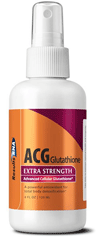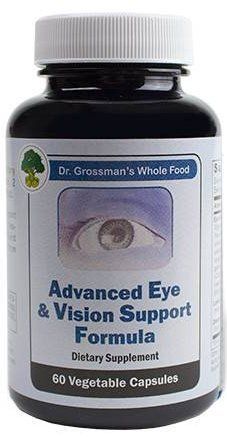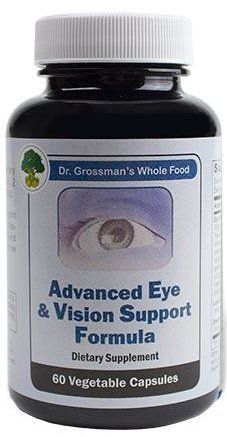
ACG Glutathione EXTRA STRENGTH Spray 2oz.
Glutathione is an antioxidant compound that is essential to making enzymes required by healthy tissue and is essential for controlling damage from free radicals. It is important for lens and retina health. This is a "reduced" form of glutathione which is more absorbable.
This spray formulation provides glutathione directly to the body with sub-mucosal absorption resulting in immediate bioavailability of key molecules to cells. A good nutrient source if you are looking for an eye vitamin spray.
Glutathione (GSH) is considered a “super-antioxidant” for overall body, brain, eye and lens health. As the most important intracellular antioxidant, GSH regulates all other antioxidants while preventing damage to important cellular components caused by reactive oxygen species such as free radicals and peroxides.
Serving size: 6 Sprays
Servings Per Container (2oz/60mL): Approx. 60
Servings Per Container (4oz/120mL): Approx. 120
AMOUNT PER SERVING
Proprietary Blend 2000mg*
Ingredients:
- N-Acetyl L-Cysteine (NAC, 2 Formulations), Acetyl L-Carnitine
- L-Glutathione Tripeptides (Reduced, 2 Formulations), L-Glutamine, Milk Thistle Extract
- N-Acetyl L-Cysteine (NAC), Acetyl L-Carnitine, L-Glutamine, L-Glutathione Tripeptides (Reduced), Lipoic Acid (R-Fraction), Ascorbic Acid and Natural Trace Minerals.
- Other Ingredients: Ultra-Pure Deionized Water
* % Daily value not established
This product is offered in 2 oz and 4 oz Intra-oral Sprays
Dietary considerations. These products are vegan and are FREE of any: corn, gluten, dairy, sugar, salt, preservative, food coloring, fructose, GMO free, egg, fish, hydrogenated oil, nut, soy, wheat, starch and. alcohol.
Recommended Dosage:
Maintenance Dosage: 6 sprays by mouth 2 times per day.
Therapeutic Dosage: 12 sprays by mouth 2 times per day.
For best results, use before meals (then wait at least 2 minutes before eating) or an hour or more after meals.
GSH Benefits
- GSH is involved with the removal of the carcinogen, Formaldehyde, from the body
- GSH reacts with various physiological metabolites such as, estrogen, prostaglandins, leukotrienes, and chemicals, such as bromobenzene and counteracts acetaminophen overdose
- GSH inhibits Influenza virus infection
- GSH interacts with Nitric oxide and both have critical roles regulating lipids, glucose, and amino acid utilization
- GSH is required for the prostaglandin H2 pathways
- GSH is involved in many other important metabolic pathways, including protein metabolism
- GSH plays an important role in spermatogenesis and sperm maturation
- GSH is required for the proliferation of cells, including lymphocytes and intestinal epithelial cells
- GSH is important for successful immune responses when the host is immunologically challenged by activating of T-lymphocytes and polymorphonuclear leukocytes, and is required for cytokine production
- GSH is involved in the process of maintaining Vitamin C and E in the active metabolic forms
*These statements have not been evaluated by the Food and Drug Administration. This product is not intended to diagnose, treat, cure or prevent any disease.
Literature Cited
- Ballatori et al (2009) Glutathione dysregulation and the etiology and progression of human diseases. Biol Chem. 2009 March; 390(3): 191–214.
- Guoyao Wu2, Yun-Zhong Fang, Sheng Yang, Joanne R. Lupton, and Nancy D. Turner. (2004) Glutathione Metabolism and Its Implications for Health. Am. Soc. Nut. Sci.
- Sies, H. (1999) Glutathione and its cellular functions. Free Radic. Biol. Med. 27:916-921.
- Badaloo, A., Reid, M., Forrester, T., Heird, W. C. & Jahoor, F. (2002) Cysteine supplementation improves the erythrocyte glutathione synthesis rate in children with severe edematous malnutrition. Glutathione Metabolism and Its Implications for Health.Am. J. Clin. Nutr. 76:646-652.
- Townsend, D. M., Tew, K. D. & Tapiero, H. (2003) The importance of glutathione in human disease. Biomed. Pharmacother. 57:145-155.
- Lyons, J., Rauh-Pfeiffer, A., Yu, Y. M., Lu, X. M., Zurakowski, D., Tompkins, R. G., Ajami, A. M., Young, V. R. & Castillo, L. (2000) Blood glutathione synthesis rates in healthy adults receiving a sulfur amino acid-free diet. Proc. Natl. Acad. Sci. U.S.A. 97:5071-5076.
- Jones, D. P. (2002) Redox potential of GSH/GSSG couple: assay and biological significance. Methods Enzymol. 348:93-112.
- Yu, Y. M., Ryan, C. M., Fei, Z. W., Lu, X. M., Castillo, L., Schultz, J. T., Tompkins, R. G. & Young, V. R. (2002) Plasma L-5-oxoproline kinetics and whole blood glutathione synthesis rates in severely burned adult humans. Am. J. Physiol. 282:E247-E258.
- Lu, S. C. (2000) Regulation of glutathione synthesis. Curr. Top. Cell Regul. 36:95-116.
- Griffith, O. W. (1999) Biologic and pharmacologic regulation of mammalian glutathione synthesis. Free Radic. Biol. Med. 27:922-935.
- Canals, S., Casarejos, M. J., de Bernardo, S., Rodriguez-Martin, E. & Mena, M. A. (2003) Nitric oxide triggers the toxicity due to glutathione depletion in midbrain cultures through 12-lipoxygenase. J. Biol. Chem. 278:21542-21549.
- Johnson, A. T., Kaufmann, Y. C., Luo, S., Todorova, V. & Klimberg, V. S. (2003) Effect of glutamine on glutathione, IGF-1, and TGF-β1. J. Surg. Res. 111:222-228.
- Fang, Y. Z., Yang, S. & Wu, G. (2002) Free radicals, antioxidants, and nutrition. Nutrition 18:872-879.
- Lei, X. G. (2002) In vivo antioxidant role of glutathione peroxidase: evidence from knockout mice. Methods Enzymol. 347:213-225.
- Cai, J., Chen, Y., Seth, S., Furukawa, S., Compans, R. W. & Jones, D. P. (2003) Inhibition of influenza infection by glutathione. Free Radic. Biol. Med. 34:928-936.
| Free 1st Class Shipping | Free 1st Class Shipping |
|---|


